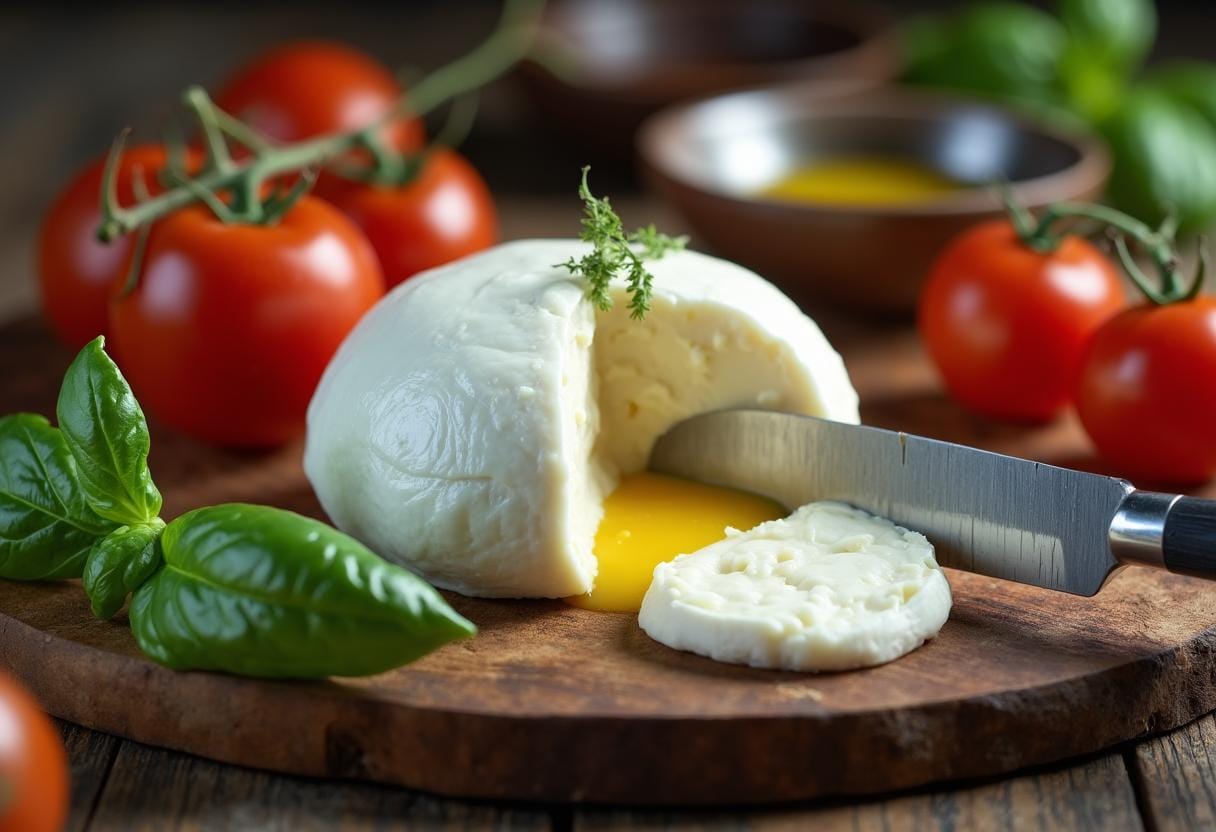Introduction to Burrata
What is the best way to use burrata? This beloved Italian cheese is more than just a dairy product—it’s an experience. From its creamy interior to its delicate outer layer, burrata is a culinary treasure that can transform simple meals into gourmet creations. If you’re wondering about the best techniques to showcase burrata’s unique qualities, you’re in for a treat.
From its creamy interior to its delicate outer layer, burrata is a culinary treasure that can transform simple meals into gourmet creations. Whether you’re a seasoned foodie or just curious about this beloved Italian ingredient, discovering the best ways to use burrata will open up a world of possibilities in your kitchen.
So, what is burrata, and why is it so special? Let’s dive into its origins, unique qualities, and versatile applications.
What is Burrata?
Burrata is a fresh Italian cheese made from cow’s milk, featuring an outer shell of mozzarella and an inner core filled with stracciatella and cream. The word “burrata” itself translates to “buttery,” a nod to its rich and luscious texture. When you slice into a ball of burrata, the creamy interior oozes out, making it both visually stunning and irresistibly delicious.
Its texture and flavor make burrata a perfect addition to both simple and elaborate dishes, offering a luxurious touch. Understanding what is the best way to use burrata begins with appreciating these unique characteristics
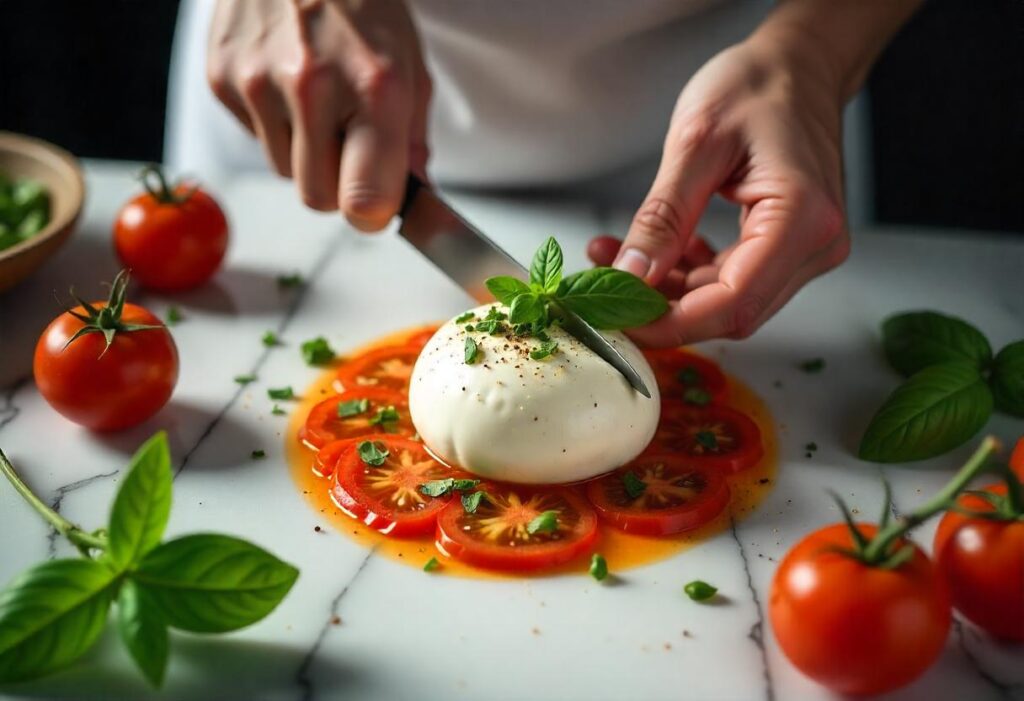
The History and Origins of Burrata
Burrata originated in Puglia, a southern Italian region renowned for its high-quality cheeses and olive oils. It was invented in the early 1900s as a way to use up leftover mozzarella scraps, which were combined with cream and encased in a mozzarella shell. Today, it’s a staple in Italian cuisine and has gained international acclaim.
What Makes Burrata Unique?
The combination of textures—silky cream and tender mozzarella—sets burrata apart from other cheeses. Its mild flavor makes it a versatile ingredient that pairs well with a variety of foods, from fresh tomatoes to crusty bread, and even desserts. Its artisanal nature also adds an air of sophistication to any dish it graces.
How to Choose the Best Burrata
Recognizing Fresh Burrata
When selecting burrata, freshness is key. A high-quality burrata will have a smooth, shiny surface and feel firm to the touch. Inside, the cream should be rich and runny, not thick or clumpy. Look for burrata that’s labeled as being produced recently, and avoid any packages with visible tears or leaks.
Storing Burrata Properly
Burrata is best enjoyed fresh, ideally on the same day you purchase it. If you need to store it, keep it in its original liquid and refrigerate it. However, serving burrata at room temperature enhances its flavor and texture, so be sure to take it out of the fridge about 30 minutes before use.
Preparing Burrata for Use
How to Serve Burrata
The beauty of burrata lies in its simplicity. What is the best way to use burrata? Start by gently cutting or tearing it open and letting the creamy interior spill onto the plate. Drizzle it with high-quality olive oil, sprinkle it with sea salt, and you’re ready to enjoy. For added depth, try a splash of balsamic vinegar or a grind of fresh black pepper.
Pairing Burrata with Complementary Ingredients
Burrata shines when paired with fresh, high-quality ingredients. Think ripe tomatoes, fresh basil, crusty bread, or seasonal fruits like figs and peaches. It also works well with salty components such as prosciutto, olives, or anchovies, creating a balanced flavor profile.
The Best Ways to Use Burrata
Burrata’s versatility makes it a standout ingredient in many dishes. If you’re searching for the best way to use burrata, look no further. Whether you’re crafting salads, pizzas, or pasta, its creamy texture and mild flavor elevate any recipe. Let’s explore some of the best ways to incorporate burrata into your meals.
Burrata in Salads
Salads featuring burrata are a feast for both the eyes and the palate. Its creamy interior complements crisp vegetables, sweet fruits, and tangy dressings, creating a harmonious balance of flavors and textures.
A classic example is the Tomato and Basil Salad with Burrata, where fresh heirloom tomatoes, basil leaves, and a drizzle of olive oil bring out the cheese’s rich taste. For more burrata-based pasta dishes, check out Burrata Pasta – A Creamy Delight for Every Occasion.
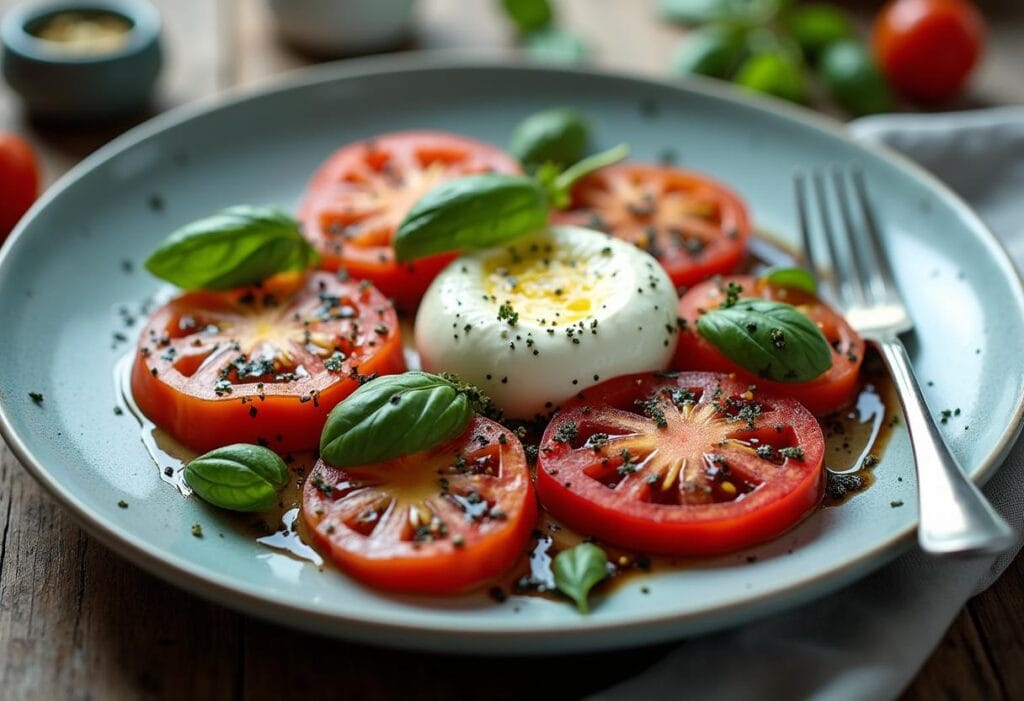
Classic Tomato and Basil Salad with Burrata
The most iconic way to enjoy burrata is in a simple tomato and basil salad. Slice ripe heirloom tomatoes, layer them with fresh basil leaves, and top with a generous ball of burrata. Drizzle with extra virgin olive oil, sprinkle with flaky sea salt, and finish with a dash of balsamic glaze. This dish is a celebration of freshness and simplicity, perfect as an appetizer or light meal.
Creative Burrata Salad Ideas
- Burrata and Arugula Salad: Pair burrata with peppery arugula, candied walnuts, and thinly sliced pears. Dress with a honey-lemon vinaigrette for a blend of savory and sweet flavors.
- Mediterranean Burrata Salad: Combine burrata with roasted red peppers, kalamata olives, and cucumber slices. Add a sprinkle of oregano and a drizzle of lemon-infused olive oil for a Mediterranean twist.
Using Burrata on Pizza
Burrata is a game-changer for pizza lovers. Adding it after baking allows its creamy center to spread across the warm crust, enhancing both texture and flavor.
For an elevated experience, try pairing burrata with figs and prosciutto on a thin, crispy crust, finished with a drizzle of balsamic glaze. If you’re looking for more ways to make your meals exciting, don’t miss How to Jazz Up Boring Pasta.

Traditional Pizza with Burrata
For a traditional approach, bake a Margherita pizza with a base of tomato sauce, fresh mozzarella, and basil. Once out of the oven, place a ball of burrata in the center, allowing the heat to slightly melt the cheese as it spreads over the pizza. This method ensures the burrata stays rich and creamy.
Innovative Pizza Combinations Featuring Burrata
- Prosciutto and Fig Pizza: Use a thin crust topped with a light layer of olive oil, caramelized onions, and fresh figs. After baking, add torn pieces of burrata and slices of prosciutto.
- Pesto Burrata Pizza: Spread a basil or arugula pesto over the crust, layer with cherry tomatoes and fresh burrata, and bake until bubbly.
Pasta Dishes with Burrata
When exploring what is the best way to use burrata, pasta dishes should not be overlooked. Burrata elevates even the simplest pasta, making it feel indulgent and gourmet
Simple Burrata Pasta with Olive Oil and Garlic
Cook spaghetti or linguine until al dente and toss it with olive oil, sautéed garlic, and red chili flakes. Top with a ball of burrata and let its creamy interior blend into the pasta as you mix it. Garnish with fresh parsley or basil for added freshness.
Burrata-Stuffed Ravioli
For a show-stopping dish, make homemade ravioli stuffed with a mixture of burrata and ricotta cheese. Serve with a light tomato or butter sauce to let the cheese’s flavor shine.
Appetizers and Small Plates with Burrata
What is the best way to use burrata for entertaining? This cheese is perfect for creating stunning appetizers and small plates that are sure to impress
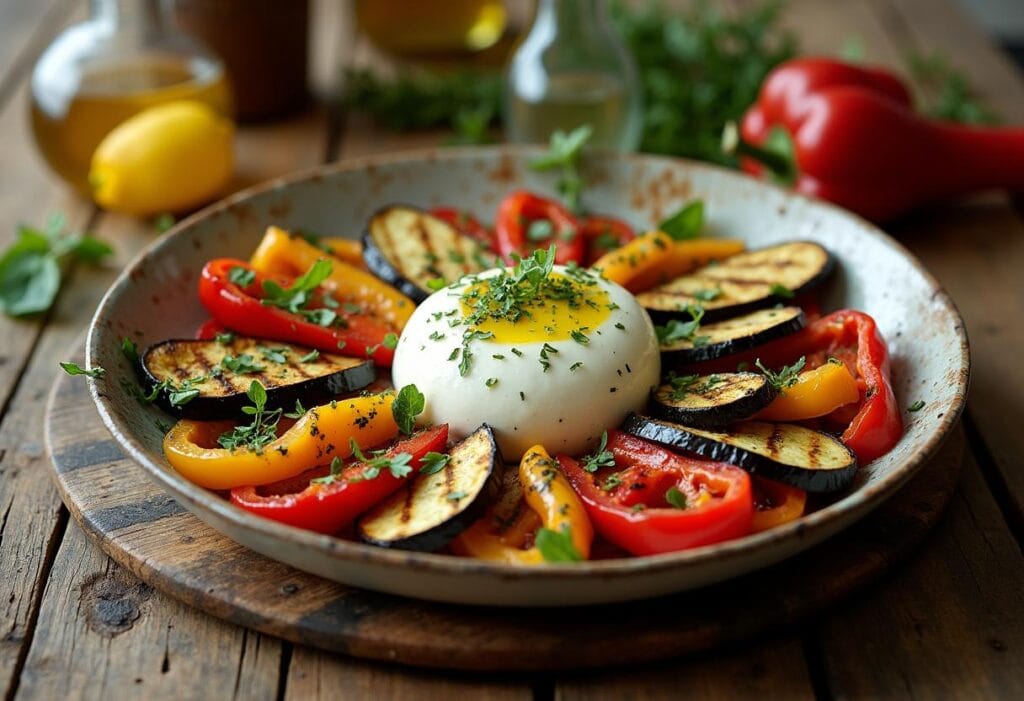
Burrata and Prosciutto Crostini
Toast slices of baguette, then layer with burrata, thin slices of prosciutto, and a drizzle of honey or balsamic glaze. The combination of creamy, salty, and sweet is irresistible.
Burrata with Grilled Vegetables
Grill vegetables like zucchini, eggplant, and bell peppers until tender. Arrange them on a platter, add burrata in the center, and drizzle with herb-infused olive oil. This dish works beautifully as a side or appetizer.
Burrata in Desserts
While primarily used in savory dishes, understanding what is the best way to use burrata includes exploring sweet applications. It works wonderfully in desserts due to its creamy texture and mild sweetness
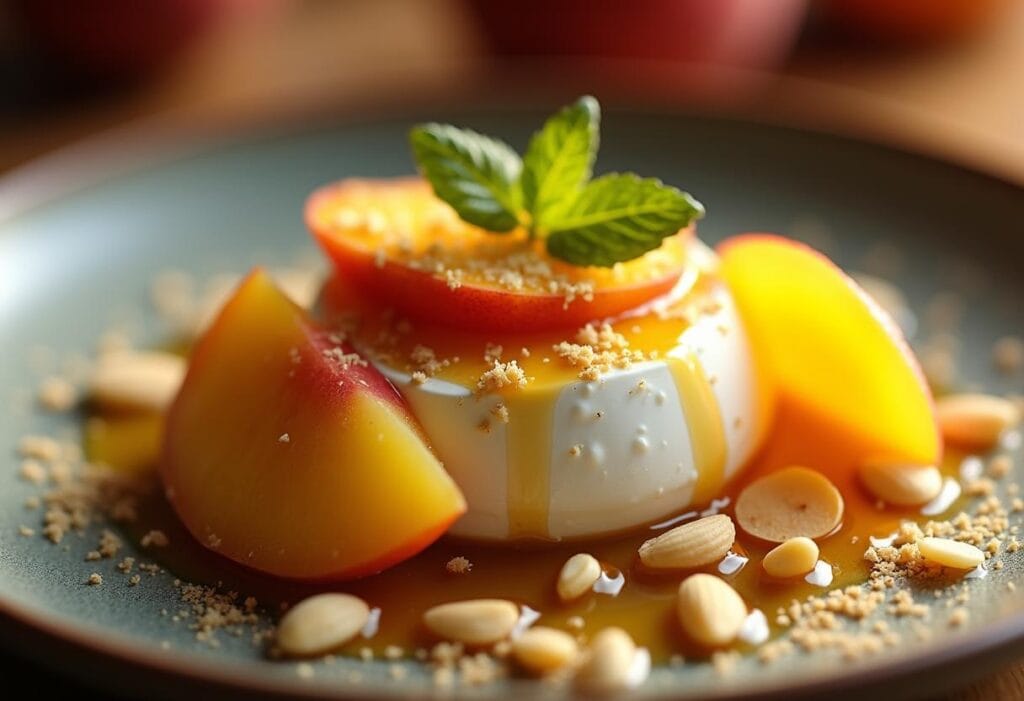
Burrata with Fresh Fruit
Pair burrata with ripe, juicy fruits like strawberries, peaches, or figs. Drizzle with honey and sprinkle with toasted almonds or pistachios for a light and refreshing dessert.
Burrata-Based Cheesecake
For an innovative twist on cheesecake, use burrata in the filling for an ultra-creamy texture. Pair it with a graham cracker crust and top with a seasonal fruit compote.
Seasonal and Regional Burrata Recipes
What is the best way to use burrata throughout the year? This cheese adapts beautifully to the flavors of each season, making it a versatile ingredient for year-round enjoyment By using seasonal produce and regional specialties, you can create dishes that highlight the cheese’s creamy richness.
Spring and Summer Burrata Dishes
Spring Burrata with Asparagus and Peas
Celebrate spring’s bounty with a vibrant burrata dish. Steam or blanch asparagus and fresh peas, then toss them in lemon juice and olive oil. Plate the vegetables with a ball of burrata, and sprinkle with fresh mint or parsley. This light and refreshing dish captures the essence of spring.
Summer Burrata Caprese with Peaches
In summer, combine burrata with juicy peaches, ripe tomatoes, and fresh basil for a twist on the classic Caprese salad. Drizzle with balsamic reduction and olive oil, and serve with crusty bread for a dish that’s as stunning as it is delicious.
Autumn and Winter Burrata Recipes
Autumn Burrata with Roasted Squash and Sage
Roast butternut squash or acorn squash with olive oil, salt, and pepper until caramelized. Arrange the roasted squash on a plate with burrata, fried sage leaves, and a drizzle of brown butter. This dish is warm, cozy, and perfect for autumn evenings.
Winter Burrata with Truffle Oil and Mushrooms
In winter, pair burrata with earthy flavors like sautéed mushrooms and truffle oil. Cook a mix of wild mushrooms in butter and garlic, then spoon them over burrata. Add a touch of truffle oil for an indulgent, winter-inspired appetizer.
Expert Tips for Enhancing Burrata’s Flavor
Even the simplest burrata dishes can be elevated with thoughtful touches. Exploring what is the best way to use burrata includes mastering these expert techniques. Here are some expert tips for getting the most out of this luxurious cheese.
Enhancing Burrata with Premium Olive Oils and Balsamic Vinegar
The quality of your olive oil and balsamic vinegar can significantly impact the flavor of your burrata dishes. Opt for cold-pressed, extra-virgin olive oil with fruity or peppery notes. Aged balsamic vinegar adds a sweet, tangy depth that complements the cheese beautifully.
Pairing Burrata with the Right Wines
Wine and burrata make an elegant pairing. For fresh, light dishes like salads, try a crisp Sauvignon Blanc or a sparkling Prosecco. Heavier dishes, such as pasta with roasted vegetables or mushroom-based appetizers, pair well with Chardonnay or a light Pinot Noir.
Common Mistakes to Avoid When Using Burrata
While burrata is a forgiving ingredient, there are some common pitfalls to watch out for to ensure you enjoy it at its best.
Overcomplicating Recipes
Burrata’s charm lies in its simplicity. Avoid overloading dishes with too many ingredients or heavy sauces that overpower the cheese’s delicate flavor. Stick to fresh, high-quality ingredients that let the burrata shine.
Serving Burrata Too Cold
Burrata tastes best at room temperature, which allows its creamy texture and subtle flavors to fully develop. Take it out of the fridge at least 30 minutes before serving to ensure the best experience.
FAQs About Burrata
What Are the Nutritional Benefits of Burrata?
Burrata is rich in protein, calcium, and healthy fats. However, it’s also calorie-dense, so it’s best enjoyed in moderation as part of a balanced diet.
Can Burrata Be Substituted with Other Cheeses?
If burrata is unavailable and you’re exploring the best way to use burrata, fresh mozzarella or ricotta can be used as substitutes, though they lack the signature creamy interior. For a more similar experience, try creamy cheeses like stracciatella.
How Long Does Burrata Last?
Burrata is highly perishable and should be consumed within 48 hours of purchase. If stored in its original liquid and refrigerated, it may last up to a few days, but the texture and flavor will degrade over time.
Is Burrata Safe for Lactose-Intolerant Individuals?
Burrata contains lactose, so those with lactose intolerance may need to avoid it or consume it in small quantities. Some lactose-free cheese options are available, though they may not replicate the texture and flavor of burrata.
What is the best way to use burrata for a beginner?
For beginners, the simplest approach is best: serve fresh burrata at room temperature with good olive oil, sea salt, and crusty bread. This lets you appreciate its unique texture and flavor before experimenting with more complex recipes
Conclusion
Burrata is a versatile and luxurious ingredient. Whether you’re making salads, pizzas, or desserts, knowing what is the best way to use burrata can transform your meals into culinary masterpieces. By focusing on high-quality ingredients and simple preparations, you can showcase its creamy texture and delicate flavor to perfection. Whether you’re hosting a dinner party or treating yourself to a special meal, incorporating burrata is sure to impress.

